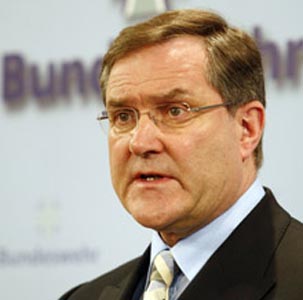Germany's shrinking influence in Afghanistan
 New Delhi/Kabul - The host was absent when German Defence Minister Franz Josef Jung held a press conference at the Kabul headquarters of the International Security Assistance Force (ISAF) in Afghanistan recently.
New Delhi/Kabul - The host was absent when German Defence Minister Franz Josef Jung held a press conference at the Kabul headquarters of the International Security Assistance Force (ISAF) in Afghanistan recently.
ISAF's commander, General David McKiernan, apparently had something better to do - unusual considering Jung is defence minister of the third-biggest supplier of troops and the fourth biggest donor nation in Afghanistan.
The snub dates back to the last joint press conference held by the two men in the late summer of 2008 when the US general used the ugly word "war" in Afghanistan, much to the annoyance of Jung.
Germany had been studiously avoiding the term when speaking of the unpopular deployment of its troops in the landlocked Asian nation. Since then the two men have avoided each other in public.
McKiernan's absence could be considered trivial were it not symptomatic of a more general problem: Germany's influence in Afghanistan and among its allies there has deteriorated markedly.
The lack of clout in ISAF, the force it once led, is particularly striking. Until the end of last year a German held the important position of chief of staff. An Italian took over at the beginning of 2009. The highest-ranking German is a deputy chief of staff, responsible for logistics.
"There are no key German figures any more who can shape things and get them moving," said one source at ISAF headquarters. "The shots are called in Kabul, not in Mazar-e-Sharif," the north Afghan town where the German troops are based.
Even though Germany has regularly upped troop numbers, it is "providing quantity, not quality," the source said.
The defence ministry in Berlin still believes Germany is adequately represented at NATO headquarters, citing the addition of a brigadier-general as "partial compensation for the loss of the chief of staff position."
The foreign ministry has said little, but a senior German aid expert working in the country blames the government for the dwindling influence in the military as well as non-military sectors.
"We have deliberately lost our influence," he said, requesting anonymity. The Germans, traditionally liked in Afghanistan, "could have gained so much influence that even the Americans would not have been able to get past us. But we never tried."
More influence means more responsibility. But taking on more responsibility is not a vote-getter at home where opinion polls show a majority of Germans would actually like to see their troops pulled out of Afghanistan.
The German government also believes it is not politically feasible to meet the requests of its allies to send German combat troops to the fiercely contested south of Afghanistan.
This reluctance has soured relations with other NATO partners like the US for a long time and led to accusations that Germany is shirking its responsibilities in Afghanistan.
The New York Times wrote recently that Washington had given up trying to press Germany to send troops to the south. It is an election year in Germany and Chancellor Angela Merkel "wants nothing to do with Afghanistan and war," the newspaper said.
Since she came to power in 2005, Merkel has paid only one visit to Afghanistan. In comparison, British Prime Minister Gordon Brown has been there three times within the space of a year.
Following the fall of the Afghanistan's fundamentalist Taliban government, Germany initially played a decisive role. It hosted a major international conference at the end of 2001 which set the course for the the country's future.
In the initial years of ISAF Germany not only provided it with the most troops, it also provided the commander twice. In 2004 Berlin hosted a major Afghan donor conference and a year later the German armed forces took command of ISAF's northern Afghanistan sector.
Berlin sent an economics adviser to the presidential palace in Kabul, but the post was scrapped in 2006. Germany took over responsibility for police training, but following massive criticism the job was taken on the by the European Union. A Dane is now in charge of the mission.
A German was the UN special representative in Kabul from March 2006 until the end of 2007. His replacement was a Norwegian.
"Basically, we don't matter any more, also not in the eyes of the Afghan government," said the aid expert. "The fact that we don't have any men or women of stature in the military, diplomatic or reconstruction effort in Kabul means the international community no longer takes notice of us."
Diplomats expressed surprise last autumn when the head of the economic interests section at the German embassy in Beijing was appointed ambassador in Kabul - a post previously held by an expert on Afghanistan.
The foreign ministry has given more importance to its Afghan and Pakistan policy by naming Bernd Muetzelburg special envoy for the region. But the former ambassador to India became entangled in the German election campaign.
Foreign Minister Frank-Walter Steinmeier, who is challenging Merkel for the chancellorship in September, did not inform Merkel's office or other relevant ministries of his decision to name Muetzelburg.
The diplomat was flying home from India when attempts were made to scupper the appointment. As a result, he will not represent the entire government, only the foreign ministry. (dpa)